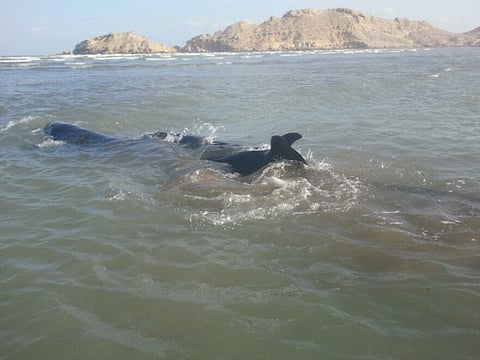4 dolphins saved after being stranded on Omani coast
Marine environmentalist escort 4 back to sea — 4 others died

Muscat: A number of false killer whales were found beached in northern Oman on Wednesday but marine environmentalists managed to save four of them while rescue operations continued on Thursday morning.
Residents of Sawadi, about 90km north of Muscat, reported the stranded animals to the Environment Society of Oman which swung into action on Wednesday to rescue the animals, the third largest member of the oceanic dolphin family.
“So far we estimate about a dozen animals were stranded,” said marine scientist Andrew Wilson, who is a member of the Renaissance Whale and Dolphin Research Team at the Environment Society of Oman (ESO).
He said they managed to successfully save four of the large dolphins — which have the same appearance as killer whales but without the distinctive black and white colours.
Badar Al Belushi, from the Ministry of Environment and Climate Affairs, along with Municipality officials, fishermen, volunteers from Five Oceans, veterinarian Elias and colleagues from the Royal Vet extended helping hand to the ESO team in the rescue work.
“We found that four of the beached dolphins had already died,” Wilson said.
“Necropsies were performed on the dead dolphins and we found two foetuses,” he revealed, adding that four of the stranded animals were female.
Wilson also said that they found almost no food remains when they opened the stomachs of the dead false killer whales. “There were some very old remains of fish,” he said.
In his opinion these dolphins could have been hungry for a long time and that could have caused them to become disoriented, losing their way and coming closer to the shore before being beached.
However, he said only after further investigation would they be able to give definitive answers as to why the dolphins beached at the Sawadi Island. “We have taken samples of liver and kidney to investigate the reasons behind the dolphins becoming stranded.”
He pointed out that hungry dolphins could get disoriented in navigation due to weakness cause by malnutrition.
Wilson also said that sometimes the group may follow the stranded leader. “They depend on a leader and sometimes 50-100 dolphins follow one,” he informed.
The sea along the Oman coast has been rough for last couple of days and even that could have caused the beaching. “The dolphins also get disoriented if the waves are breaking and that could cause them to be stranded in the shallow waters.”
One of the unlikely but possible reasons is that predators chased them to shallow waters. “Noise from undersea blasts or shipping movement can affect their hearing ability and they can lose their way,” Wilson added.
Oman is home to almost 20 species of whales and dolphins.



